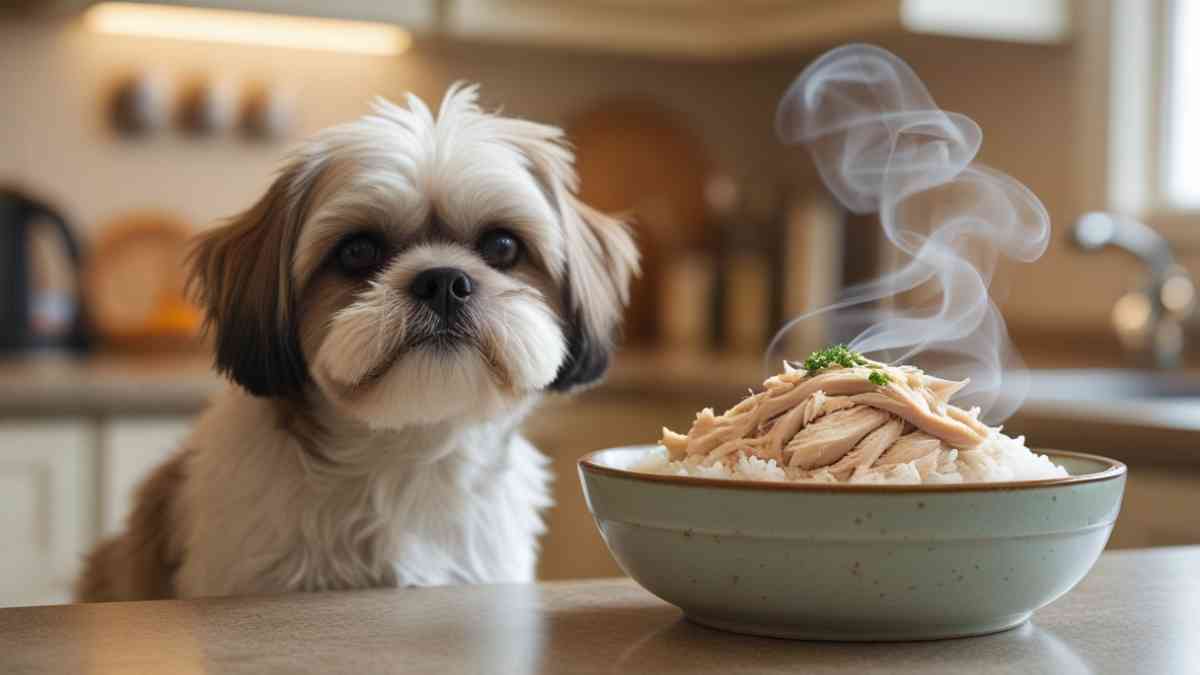Homemade Chicken and Rice Recipe for Shih Tzu Dogs

Chicken and rice is a gentle, nutritious combination that can help support your Shih Tzu’s digestion, especially when their stomach is sensitive. It’s a go-to option for many dog parents when their pup has minor gastrointestinal issues, and when done right, it can be a soothing, effective temporary diet.
What is Chicken and Rice for Shih Tzus?
Chicken and rice for Shih Tzus refers to a bland, home-cooked meal made with simple ingredients: boiled chicken (boneless and skinless) and plain white rice. It’s not a long-term dog food substitute, but rather a short-term solution often recommended by veterinarians to help dogs recover from vomiting, diarrhea, or a loss of appetite.
Why This Combo Works Well
This combination is recommended because both ingredients are gentle on the digestive tract. Chicken provides lean protein, essential for tissue repair and energy. White rice offers easily digestible carbohydrates, which can help soothe an irritated stomach and firm up loose stools.
When Is It Appropriate to Use?
Feeding chicken and rice is most suitable during episodes of gastrointestinal distress, such as loose stool, vomiting, or after a surgery when your vet suggests a bland diet. It’s not intended as a permanent solution, but for temporary relief and nutritional support while your dog recovers.
Ingredients Needed
The recipe is simple and consists of:
- Boneless, skinless chicken breast or thighs
- Plain white rice (avoid brown rice during digestive issues)
- Clean water for boiling
Never add seasonings, butter, oil, garlic, or onions. These can be harmful to your Shih Tzu.
Cooking Instructions
Start by boiling the chicken until it’s fully cooked and no pink remains. Then remove and shred it into small, bite-sized pieces that are easy for your Shih Tzu to chew and digest. In a separate pot, boil the white rice until it’s soft and fluffy. A good rule of thumb is to mix two parts rice to one part chicken.
Once the mixture has cooled to room temperature, serve in small, measured portions. Store leftovers in an airtight container in the fridge for up to 3 days.
Serving and Portion Sizes
A typical portion for an adult Shih Tzu is about 1/2 to 1 cup per meal, depending on their weight and health. Puppies may need smaller, more frequent servings. Feed two to three times a day and observe your dog’s stool, appetite, and energy levels.
Benefits of Chicken and Rice
This meal provides numerous short-term benefits for your dog:
- Soothes digestive upset by calming inflammation and reducing bowel movement frequency
- Restores energy through a balance of protein and carbs
- Encourages appetite in dogs that are refusing regular food
- Hydrates the body, especially when the food is served warm and moist
Short-Term Use Only
While helpful, this diet is not nutritionally complete. It lacks essential fatty acids, vitamins, and minerals needed for long-term health. Feeding it for more than a few days may result in nutritional deficiencies. Always transition your Shih Tzu back to a complete, balanced dog food once their symptoms improve.
Transitioning Back to Normal Food
Once your Shih Tzu has returned to normal stools and appetite, begin reintroducing their regular food gradually. Mix a small portion of kibble with the chicken and rice, increasing the kibble amount and decreasing the homemade food over 3–5 days. This helps avoid re-irritation of the gut.
Precautions and Common Mistakes
Avoid the common pitfall of using chicken and rice as a daily meal without veterinary supervision. Also, make sure the chicken is fully cooked and never seasoned. Feeding undercooked meat or seasoned food can worsen your dog’s condition.
Another mistake is using brown rice, which contains more fiber and is harder to digest during GI upset. Stick to plain white rice during sensitive phases.
Allergy Considerations
While rare, some Shih Tzus may be allergic to chicken. Signs include itching, ear infections, or continued vomiting and diarrhea even after switching to a bland diet. If these symptoms persist, consult your vet immediately.
Better Alternatives in Some Cases
If chicken isn’t tolerated, alternatives like boiled turkey, lean ground beef, or sweet potato with rice may be recommended. You should always get approval from your vet before changing the protein source.
Homemade vs. Commercial Dog Food
Homemade meals give you control over ingredients but lack some essential nutrients unless you use supplements. Most balanced commercial dog foods for small breeds like Shih Tzus are fortified with vitamins, minerals, and probiotics. Brands like Hill’s Science Diet, Royal Canin, or Blue Buffalo Small Breed Formulas are excellent long-term solutions.
However, during a short-term digestive issue, homemade chicken and rice can be more effective due to its plain, easily digestible nature.
Signs Your Dog Is Getting Better
If the chicken and rice meal is working, your Shih Tzu should show improvements within 24 to 48 hours. Look for:
- Firmer stool
- Increased energy
- Normal appetite
- Reduced vomiting or diarrhea
If symptoms persist beyond 2 days or worsen, discontinue the bland diet and consult your vet.
Proper Storage and Food Safety
Store leftover chicken and rice in the refrigerator in a sealed container. Discard after 72 hours to prevent bacterial contamination. When reheating, ensure it’s warm—not hot—before serving.
Vet-Approved Feeding Guidelines
Veterinarians usually suggest using this diet no longer than 3 to 5 days, depending on the severity of symptoms. It’s always best to follow a vet’s advice, especially if your Shih Tzu has pre-existing health conditions.
Real-World Application
Many dog owners have seen positive results by using this simple recipe during episodes of stomach upset. It’s a trusted first-aid meal that can be made with pantry staples in emergencies, offering both comfort and recovery to your beloved Shih Tzu.
Conclusion
Shih Tzus are affectionate, sensitive dogs with delicate stomachs. Serving them chicken and rice during rough digestive days can be a caring act of love. But it’s important to recognize that this is a temporary comfort, not a substitute for complete nutrition. With proper vet guidance and gradual transition, your Shih Tzu can bounce back from digestive upset and return to their playful, energetic self.
“When your Shih Tzu’s tummy needs time to heal, a bowl of warm chicken and rice—served with love and care—can make all the difference.”
Nourish your Shih Tzu’s tummy with this gentle, healing meal.




